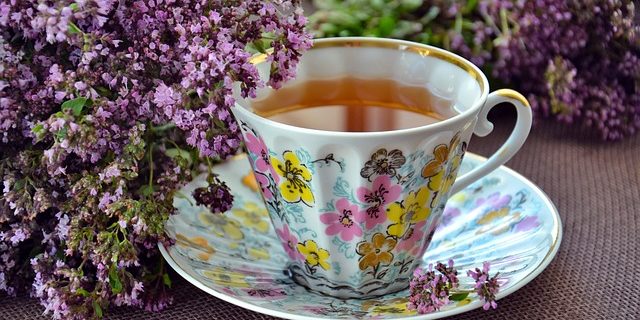Digestive distress is all too common among Americans. There are probably plenty of reasons for it: stress, eating on the run, eating over-processed food, eating too much or too little or the wrong foods for our body type. There are some digestive issues that are more serious, but for most of us it’s the everyday discomforts that make getting through our days just that much harder. Gas, bloating, nausea, occasional heartburn, abdominal cramps, or just feeling a bit “off”. Fortunately, there’s an herb for that! Below are some of my all-time favorite herbs for the stomach.
Ginger Root, Zingiber officinale
Ginger is usually the very first thing I reach for, no matter what the trouble. Ginger root soothes nausea, increases appetite, improves digestion and absorption, and stimulates blood flow to the stomach, easing bloating and discomfort. If you tend to get heartburn, use only the fresh ginger root as it is less heating that the dried. Ginger can be taken as tea (my favorite), in capsules or liquid extract, or as soft chewy candies. I take the candies with me when I travel to help with motion sickness and unfamiliar food.
Chamomile, Matricaria chamomilla
Many of us learned of Chamomile tea from Peter Rabbit’s mom, and she was absolutely right about this lovely little plant’s medicinal qualities. Chamomile is a mild bitter-sweet flower that soothes stomach cramps and indigestion. It also is a child-safe remedy for fussiness, nerves, teething, and being unable to settle down to sleep. A cup of chamomile tea is tasty, even better with a drop of honey, and effective for minor discomforts of all kinds. (*please note: Chamomile is related to Ragweed, do not drink it if you are allergic to Ragweed!*)
Lavender, Lavandula officinalis/angustifolia
You may know Lavender for its stress-easing and sleep-encouraging properties, and it is wonderfully helpful for both. In fact, I wash my sheets and pillowcases with a lavender soap to encourage more restful nights, and have for years. But Lavender is also a digestive tonic, and a good choice for those who tend to struggle to feel hungry, or have “nervous stomachs”. Sometimes just an aromatherapy inhaler of Lavender oil can help to settle the nerves and encourage a healthy appetite. A tea of Lavender flowers is a delicious way to get the same soothing effect.
Fennel, Foeniculum vulgare
Fennel seeds are chewed to ease gas cramps, and I find them also to be very helpful with that over-full feeling one can get after eating out or eating at holidays. In some parts of India Fennel seeds are candied and served at the end of meals, in other parts they are dusted with Turmeric powder (Turmeric can help with the digestion of oily or overly sweet foods). If you are prone to gas or bloating, Fennel tea, with its mild sweet taste, makes a lovely after-dinner drink.
Lemon Balm, Melissa officinalis
An easy-to-grow member of the Mint family, Lemon Balm is one of my all time favorite herbs. It is delicious, with a distinctive lemon flavor, soothing and healing to the digestion, and a calming nervine for all ages. Its small white flowers are a favorite of honeybees, and its leaves a favorite of rabbits and humans alike! Lemon Balm is specifically healing to the large intestine, and the tea can be drunk in copious quantities to encourage healthy bowel movements (it is not, however, a laxative). For the upper GI tract, it cools and soothes heartburn and mild nausea. Like Chamomile it is safe for children, and is often used to help over-active children get more centered and calm.
There are plenty more wonderful herbs for the digestion, but let me leave you with a simple and effective tea. This can be taken anytime, before or after meals. It is also a lovely bedtime drink, as all three of these herbs are calming to the mind.
Soothing Tummy Tea
1 part Chamomile flowers
1 part Lavender flowers
1 part Lemon Balm leaves
Pour 1 cup boiling water over 1 teaspoon of blended dry herbs. Cover and let steep 5-10 minutes. Strain and drink. Add honey if desired. Enjoy!








